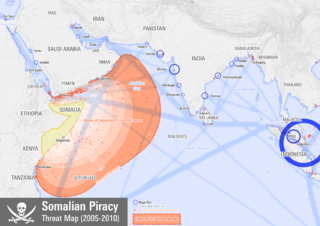
The International Maritime Organization is a specialised agency of the United Nations responsible for regulating maritime transport. The IMO was established following agreement at a UN conference held in Geneva in 1948 and the IMO came into existence ten years later, meeting for the first time on 17 March 1958. Headquartered in London, United Kingdom, the IMO, in 2024, has 176 Member States and three Associate Members.

The Gulf of Guinea is the northeasternmost part of the tropical Atlantic Ocean from Cape Lopez in Gabon, north and west to Cape Palmas in Liberia. Null Island, defined as the intersection of the Equator and Prime Meridian, is in the gulf.

United Nations Security Council Resolution 1674, adopted unanimously on April 28, 2006, after reaffirming resolutions 1265 (1999) and 1296 (2000) concerning the protection of civilians in armed conflict and Resolution 1631 (2005) on co-operation between the United Nations and regional organisations, the Council stressed a comprehensive approach to the prevention of armed conflict and its recurrence.
Maritime security is an umbrella term informed to classify issues in the maritime domain that are often related to national security, marine environment, economic development, and human security. This includes the world's oceans but also regional seas, territorial waters, rivers and ports, where seas act as a “stage for geopolitical power projection, interstate warfare or militarized disputes, as a source of specific threats such as piracy, or as a connector between states that enables various phenomena from colonialism to globalization”. The theoretical concept of maritime security has evolved from a narrow perspective of national naval power projection towards a buzzword that incorporates many interconnected sub-fields. The definition of the term maritime security varies and while no internationally agreed definition exists, the term has often been used to describe both existing, and new regional and international challenges to the maritime domain. The buzzword character enables international actors to discuss these new challenges without the need to define every potentially contested aspect of it. Maritime security is of increasing concern to the global shipping industry, where there are a wide range of security threats and challenges. Some of the practical issues clustered under the term of maritime security include crimes such as piracy, armed robbery at sea, trafficking of people and illicit goods, illegal fishing or marine pollution. War, warlike activity, maritime terrorism and interstate rivalry are also maritime security concerns.
Maritime Security Regimes are codes and conventions of behavior agreed upon by coastal states to provide a degree of security within territorial waters and on the high seas.

Piracy in the Gulf of Guinea affects a number of countries in West Africa as well as the wider international community. By 2011, it had become an issue of global concern. Pirates in the Gulf of Guinea are often part of heavily armed criminal enterprises, who employ violent methods to steal oil cargo. In 2012, the International Maritime Bureau (IMB), Oceans Beyond Piracy and the Maritime Piracy Humanitarian Response Program reported that the number of vessels attacks by West African pirates had reached a world high, with 966 seafarers attacked during the year. According to the Control Risks Group, pirate attacks in the Gulf of Guinea had by mid-November 2013 maintained a steady level of around 100 attempted hijackings in the year, a close second behind the Strait of Malacca in Southeast Asia.

United Nations Security Council Resolution 1918, adopted unanimously on April 27, 2010, after recalling resolutions 1814 (2008), 1816 (2008), 1838 (2008), 1844 (2008), 1846 (2008), 1851 (2008) and 1897 (2008) on Somalia, the Council called on countries to criminalise piracy within their national laws.

United Nations Security Council resolution 1160, adopted on 31 March 1998, after noting the situation in Kosovo, the council, acting under Chapter VII of the United Nations Charter, imposed an arms embargo and economic sanctions on the Federal Republic of Yugoslavia, hoping to end the use of excessive force by the government.

United Nations Security Council Resolution 1949, adopted unanimously on 23 November 2010, after recalling previous resolutions on the situation in Guinea-Bissau, particularly Resolution 1876 (2009), the Council extended the mandate of the United Nations Integrated Peacebuilding Office in Guinea-Bissau (UNIOGBIS) for a further period of one year until 31 December 2011.

United Nations Security Council Resolution 1950, adopted unanimously on November 23, 2010, after recalling previous resolutions on the situation in Somalia, including resolutions 1814 (2008), 1816 (2008), 1838 (2008), 1844 (2008), 1846 (2008), 1851 (2008), 1897 (2009) and 1918 (2010); the Council re-authorised states to intervene in acts of piracy by Somali pirates at sea for a further period of twelve months.

United Nations Security Council Resolution 1962, adopted unanimously on December 20, 2010, after recalling previous resolutions on the situation in Côte d'Ivoire, including resolutions 1893 (2009), 1911 (2010), 1924 (2010), 1933 (2010), 1942 (2010), 1946 (2010) and 1951 (2010), the Council extended the mandate of the United Nations Operation in Côte d'Ivoire (UNOCI) until June 30, 2011 and urged all Ivorian parties to respect the outcome of the presidential election and the recognition of Alassane Ouattara as president.

Piracy in the 21st century has taken place in a number of waters around the globe, including but not limited to, the Gulf of Guinea, Gulf of Aden, Arabian Sea, Strait of Malacca, Sulu and Celebes Seas, Indian Ocean, Bay of Bengal and Falcon Lake.

United Nations Security Council Resolution 2020 was unanimously adopted on 22 November 2011.
United Nations Security Council Resolution 1897 was unanimously adopted on 30 November 2009.
United Nations Security Council Resolution 1816 was unanimously adopted on 2 June 2008.

Piracy in Somalia has been a threat to international shipping since the beginning of the country's civil war in the early 1990s. Since 2005, many international organizations have expressed concern over the rise in acts of piracy. Piracy impeded the delivery of shipments and increased shipping expenses, costing an estimated $6.6 to $6.9 billion a year in global trade in 2011 according to Oceans Beyond Piracy (OBP).
Piracy has taken place in a maritime area bounded by Suez and the Strait of Hormuz, in the region around the Horn of Africa, and waters surrounding the Arabian Peninsula; in the region of the Indian Ocean from the Red Sea through the Arabian Sea to the Gulf of Oman.











